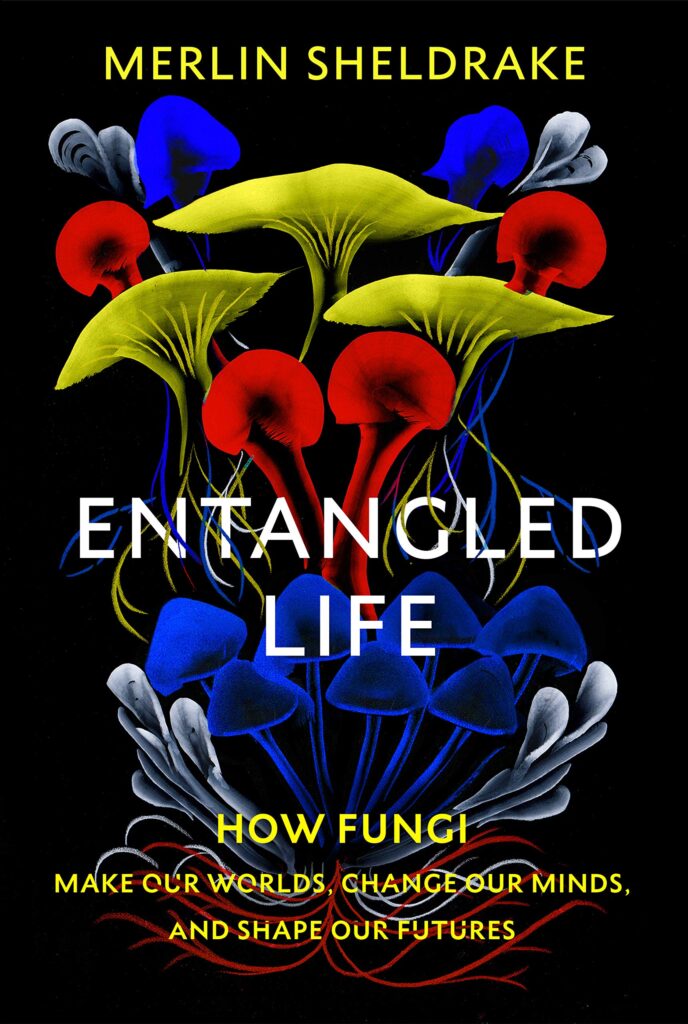Book Review | Entangled Life by Merlin Sheldrake
Written by Matsi Wa Lesego
It’s relatively easy to focus on what we know, what we can see and experience. However, the greatness of our existence and life itself, is never greater or scarier than when we engage with the unknown.
The existence of our species is never more astonishing than when we take note of the sliver of time we’ve inhabited, compared to the billions of years of the past and the untold billions of the future. One can feel refreshingly small. If we begin to look at the possibility of other worlds that could exist in the cosmos, we can grasp how insignificant our day-to-day life is. In my opinion, nothing compares to the daunting reality of being reminded of what we don’t know – like learning about fungi. Yes, believe it or not, fungi.

Entangled Life by biologist and writer Merlin Sheldrake, is an access point that opens up questions surrounding fungi’s provenance and how it impacts our existence. I must confess, before reading Entangled Life, my general perception of fungi was that it’s repulsive, dangerous and filled with life-threatening diseases and should be avoided at all costs. Granted, there are species of fungi that fit that description however, not all of them are situated within that paradigm. Some play an impressively important role in our ecology.
“Fungi are everywhere but they are easy to miss. They are inside you and around you.” –
Entangled Life by Merlin Sheldrake
One of the many common misconceptions about fungi is that they are mushrooms, which is only partially accurate. Like fruits of plants, mushrooms are the fruiting bodies of fungi, which is where the spores are produced. Fungi use spores like plants use seeds to disperse themselves into the atmosphere, making them the largest source of living particles in the air. This simply means we are all living amongst and inhaling fungi.
Fungi have received little attention compared to the animal and plant kingdoms. As a result, over ninety percent of their species remain undocumented. This is shocking, considering they largely constitute new ecosystems founded on land and facilitate an imperative role in understanding the earth and the way we “think, feel and behave”, as they have sustained us and all we depend on.
Fungi, which have long been classified with plants, are in actual fact closely related to animals. This is primarily owed to a lack of research dedicated to exploring the vast and intricate knowledge we have yet to understand about fungi. For example, the biosphere is sustained by fungal networks that sustain and support various plant lives. According to Meldrake:
“Many of the most dramatic events on Earth have been—and continue to be—a result of fungal activity. Plants only made it out of the water around five hundred million years ago because of their collaboration with fungi, which served as their root systems for tens of million years until plants could evolve their own.”
Apart from its influence on our plant life, fungi are vital in producing crucial elements we need in our society such as cyclosporine, which is an immunosuppressant drug that makes organ transplants possible, vaccines, the citric acid found in fizzy drinks, medicine and many more.
Fungi are, without a doubt, fascinating organisms. Their intelligence is their growing awareness of advanced problem-solving behaviours that have developed in brainless organisms outside the animal kingdom. This can be engaged through the behaviour exhibited by the fungi, physarum, which forms “exploratory networks” and have no “central nervous system”. Yet this species poses the ability to seemingly make decisions on its own.
“[…] many are capable of sophisticated behaviours that prompt us to think in new ways about what it means for organisms to “solve problems,” “communicate,” “make decisions,” “learn,” and “remember.””
Entangled Life by Merlin Sheldrake
Earth’s systems and structures, such as the design of transportation networks, are owed to other network-based organisms such as mycelium fungi and slime molds, which have been studied and used to develop systems for humanity. Mycelial networks are decentralised organisms with no centre of control, i.e. no brain and no heart, making it an intriguing organism, as control is dispersed.
“A fragment of mycelium can regenerate an entire network, meaning that a single mycelial individual—if you’re brave enough to use that word—is potentially immortal.”
Entangled Life by Merlin Sheldrake
What could this potentially mean for the evolution of our ecosystems? Who are we without fungi? There are a lot of questions that this book presents surrounding the ontology of sustainability of all forms of life on Earth. The importance of fungi is too great to negate as a mere plant when it is crucial in all that we breathe, see, eat and experience.
A lot of interest in fungal news has also peaked through pop-culture’s HBO’s hit dystopian zeitgeist television series The Last Us, which is an adaptation of a video game about a fungus that turns humans into zombies. Funnily enough, the show’s creators based the fungus on the real-life species Ophiocordyceps unilateratis, nicknamed “cordyceps” or the “zombie-ant fungus”. This fungus infects insects such as ants or spiders, and deprives its host’s body of nutrients, before replacing them with spores to reproduce. The fungus can perform a level of “mind control” on the insect, to travel to different destinations to expel its spores, spreading the infection as widely as possible.
As scary and creepy as that sounds, it’s rather fascinating. The reality that there’s a whole world, a kingdom of living organisms that we only understand a fraction of compared to the animal– and plant kingdoms, is a daunting and exciting pursuit. Entangled Life is a threshold that allows readers to not only think of their reality differently but understand that everything is connected. Our environment, our societies and even our bodies intertwine with fungi, and there is still so much about it that we have yet to understand.
Merlin Sheldrake presents a fruitful book that gives readers a refreshing and fascinating perspective on the fungal kingdom in an honest way. Entangled Life raises many important and relevant questions about our environment in the past, present and future.

